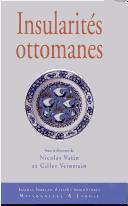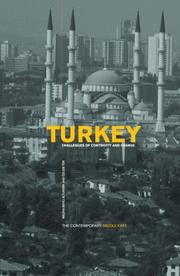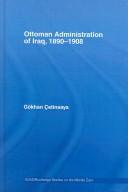| Listing 1 - 10 of 186 | << page >> |
Sort by
|
Book
ISBN: 9048532736 9462982694 Year: 2018 Publisher: Amsterdam : Amsterdam University Press,
Abstract | Keywords | Export | Availability | Bookmark
 Loading...
Loading...Choose an application
- Reference Manager
- EndNote
- RefWorks (Direct export to RefWorks)
Homer's stories of Troy are part of the foundations of Western culture. What's less well known is that they also inspired Ottoman-Turkish cultural traditions. Yet even with all the historical and archaeological research into Homer and Troy, most scholars today rely heavily on Western sources, giving Ottoman work in the field short shrift. This book helps right that balance, exploring Ottoman-Turkish involvement and interest in the subject between 1870, when Heinrich Schliemann began his excavations in search of Troy on Ottoman soil, and the battle of Gallipoli in 1915, which gave the Turks their own version of the heroic epic of Troy.
Turkey --- Ottoman Empire --- History --- Turkey-History-Ottoman Empire, 1288-1918. --- HISTORY / General. --- Homer --- Influence. --- Annals --- Auxiliary sciences of history --- Troy, Homer, Heritage, Identity, Ottoman Empire. --- Ottoman Empire, 1288-1918
Book
ISBN: 9783111060392 311106039X 3111057801 Year: 2024 Publisher: De Gruyter
Abstract | Keywords | Export | Availability | Bookmark
 Loading...
Loading...Choose an application
- Reference Manager
- EndNote
- RefWorks (Direct export to RefWorks)
This first volume of Collected Works of the ERC Project TYPARABIC focuses on the history of printing during the 18th century in the Ottoman Empire and the Romanian Principalities among diverse linguistic and confessional communities. Although "most roads lead to Istanbul," the many pathways of early modern Ottoman printing also connected authors, readers and printers from Central and South-Eastern Europe, Western Europe and the Levant. The papers included in this volume are grouped in three sections. The first focuses on the first Turkish-language press in the Ottoman capital, examining the personality and background of its founder, İbrahim Müteferrika, the legal issues it faced, and its context within the multilingual Istanbul printing world. The second section brings together studies of printing and readership in Central and South-East Europe in Romanian, Greek and Arabic. The final section is made up of studies of the Arabic liturgical and biblical texts that were the main focus of Patriarch Athanasios III Dabbās' efforts in the Romanian Principalities and Aleppo. This volume will be of interest to scholars of the history of printing, Ottoman social history, Christian Arabic literature and Eastern Orthodox liturgy.

ISBN: 2706817933 2362450481 Year: 2004 Publisher: Paris Maisonneuve & Larose
Abstract | Keywords | Export | Availability | Bookmark
 Loading...
Loading...Choose an application
- Reference Manager
- EndNote
- RefWorks (Direct export to RefWorks)
L’Empire ottoman était aussi un empire maritime. Cette facette de sa nature a suscité chez les historiens un intérêt croissant depuis quelques années. Consacré à l’« insularité ottomane », le présent volume est une participation originale aux réflexions en cours. Son objet n’est pas de rassembler des monographies, mais de répondre à la question suivante : en quoi les îles étaient-elles des territoires différents des autres, avec des populations spécifiques, des problèmes spécifiques et des solutions spécifiques ? À partir de sources souvent inédites, les contributeurs s’interrogent ainsi sur la logique présidant à la conquête des îles, sur leur organisation et sur la façon dont la Porte considérait ces territoires un peu particuliers. Abordant également la question du point de vue des îles elles-mêmes, ils se penchent sur la composition ethnique et religieuse des sociétés insulaires, évaluent leur éventuel caractère de conservatoire ethnographique, examinent les modalités des communications des îles entre elles et avec le reste du monde, soulignent les problèmes de sécurité liés notamment au risque pirate. Enfin des éléments de comparaison avec d’autres insularités méditerranéennes permettent de mieux cerner les spécificités ottomanes. Un intérêt particulier est évidemment accordé aux îles méditerranéennes, mais d’autres îles ottomanes, qui n’avaient jamais fait l’objet d’études, sont également traitées : îles de la mer Rouge, îles du Danube.
Islands --- History. --- Turkey --- History --- Isles --- Islets --- Landforms --- Ottoman Empire --- Ottoman Empire, 1288-1918 --- politique maritime --- Îles --- Empire ottoman --- histoire --- identité collective --- Turquie --- Iles --- Identité collective --- Politique maritime --- Histoire --- Civilisation
Book
ISBN: 9789004305809 9004305807 9004293124 9789004293120 Year: 2016 Publisher: Leiden, Netherlands : Brill,
Abstract | Keywords | Export | Availability | Bookmark
 Loading...
Loading...Choose an application
- Reference Manager
- EndNote
- RefWorks (Direct export to RefWorks)
This volume explores the variety of ways in which childhood was experienced, lived and remembered in the late Ottoman Empire and its successor states. The period of the late nineteenth and early twentieth centuries was a time of rapid change, and the history of childhood reflects the impact of new expectations, lived realities and national responsibilities on the youngest members of societies undergoing monumental change because of ideological, wartime and demographic shifts. Drawing on comparisons both within the Balkans, Turkey and the Arab lands and with Western Europe and beyond, the chapters investigate the many ways in which upheaval and change affected the youth. Particular attention is paid to changing conceptions of childhood, gender roles and newly dominant national imperatives. Contributors include: Elif Akşit, Laurence Brockliss, Nazan Çiçek, Alex Drace-Francis, Benjamin C. Fortna, Naoum Kaytchev, Duygu Köksal, Kathryn Libal, Nazan Maksudyan, Heidi Morrison, and Philipp Wirtz. This title, in its entirety, is available online in Open Access.
Children --- Social conditions. --- Turkey --- Social conditions --- Childhood --- Kids (Children) --- Pedology (Child study) --- Youngsters --- Age groups --- Families --- Life cycle, Human --- history --- Istanbul --- Ottoman Empire --- Turkish people
Book
ISBN: 1474439020 Year: 2019 Publisher: Edinburgh : Edinburgh University Press,
Abstract | Keywords | Export | Availability | Bookmark
 Loading...
Loading...Choose an application
- Reference Manager
- EndNote
- RefWorks (Direct export to RefWorks)
Explores translation in the context of the multi-lingual, multi-ethnic late-Ottoman Mediterranean world. Fénelon, Offenbach and the Iliad in Arabic, Robinson Crusoe in Turkish, the Bible in Greek-alphabet Turkish, excoriated French novels circulating through the Ottoman Empire in Greek, Arabic and Turkish: literary translation at the eastern end of the Mediterranean offered worldly vistas and new, hybrid genres to emerging literate audiences in the nineteenth and early-twentieth centuries. Whether to propagate 'national' language reform, circulate the Bible, help audiences understand European opera, argue for girls' education, institute pan-Islamic conversations, introduce political concepts, share the Persian Gulistan with Anglophone readers in Bengal, or provide racy fiction to schooled adolescents in Cairo and Istanbul, translation was an essential tool. But as these essays show, translators were inventors, and their efforts might yield surprising results.
History / Middle East / Turkey & Ottoman Empire --- Literary Criticism / Comparative Literature --- Literature --- History and criticism --- Appraisal of books --- Books --- Evaluation of literature --- Criticism --- Literary style --- Appraisal --- Evaluation
Multi
ISBN: 9781474439015 1474439012 9781474438995 1474438997 9781474439022 1474439020 1474439004 9781474439008 Year: 2019 Publisher: Edinburgh : Edinburgh University Press,
Abstract | Keywords | Export | Availability | Bookmark
 Loading...
Loading...Choose an application
- Reference Manager
- EndNote
- RefWorks (Direct export to RefWorks)
Explores translation in the context of the multi-lingual, multi-ethnic late-Ottoman Mediterranean world. Fénelon, Offenbach and the Iliad in Arabic, Robinson Crusoe in Turkish, the Bible in Greek-alphabet Turkish, excoriated French novels circulating through the Ottoman Empire in Greek, Arabic and Turkish: literary translation at the eastern end of the Mediterranean offered worldly vistas and new, hybrid genres to emerging literate audiences in the nineteenth and early-twentieth centuries. Whether to propagate 'national' language reform, circulate the Bible, help audiences understand European opera, argue for girls' education, institute pan-Islamic conversations, introduce political concepts, share the Persian Gulistan with Anglophone readers in Bengal, or provide racy fiction to schooled adolescents in Cairo and Istanbul, translation was an essential tool. But as these essays show, translators were inventors, and their efforts might yield surprising results.
Mediterranean Region. --- Middle East --- History / Middle East / Turkey & Ottoman Empire --- Literary Criticism / Comparative Literature --- Literature --- History and criticism --- Translating and interpreting --- Translations --- History and criticism. --- History --- Middle East.

ISBN: 0415287103 0415274206 0203644123 1134446365 1280062878 1134446357 9780203644126 9781134446315 9781134446353 9781134446360 9780415274203 9780415287104 9812587136 Year: 2005 Publisher: London : Routledge,
Abstract | Keywords | Export | Availability | Bookmark
 Loading...
Loading...Choose an application
- Reference Manager
- EndNote
- RefWorks (Direct export to RefWorks)
Turkey --- Empire ottoman --- Turquie --- History --- Politics and government --- Economic conditions --- Foreign relations --- Histoire --- Politique et gouvernement --- Conditions économiques --- Relations extérieures --- Political science. --- Administration --- Civil government --- Commonwealth, The --- Government --- Political theory --- Political thought --- Politics --- Science, Political --- Social sciences --- State, The --- 281.1 Staatsrecht per land (behalve Belgie) --- #A0511PSA --- Ottoman Empire --- Economic conditions. --- Foreign relations. --- Politics and government. --- Ottoman Empire, 1288-1918

ISBN: 1134294956 1280538929 9786610538928 0203332466 0203481321 0415341582 0415665817 Year: 2006 Publisher: Abingdon, Oxon : Routledge,
Abstract | Keywords | Export | Availability | Bookmark
 Loading...
Loading...Choose an application
- Reference Manager
- EndNote
- RefWorks (Direct export to RefWorks)
This is a study of the nature of Ottoman administration under Sultan Abdulhamid and the effects of this on the three provinces that were to form the modern state of Iraq. The author provides a general commentary on the late Ottoman provincial administration and a comprehensive picture of the nature of its interaction with provincial society. In drawing on sources of the Ottoman archives, bringing together and analyzing an abundance of complex documents, this book is a fascinating contribution to the field of Middle Eastern studies.
Iraq --- Turkey --- History --- Social conditions --- Ottoman Empire --- Irak --- Rāfidayn, Bilād --- Bilād al-Rāfidayn --- Republic of Iraq --- Jumhuriyah al Iraqiyah --- Ottoman Empire, 1288-1918 --- Regional studies --- Middle Eastern history --- Politics & government --- Public administration --- 6th --- army --- government --- grand --- vizier --- baghdad --- vilayet --- ibn --- saud --- railway --- Nonfiction. --- History. --- Politics.
Book
ISBN: 2810708681 2810703361 9782810703364 Year: 2019 Publisher: Toulouse : Presses universitaires du Midi,
Abstract | Keywords | Export | Availability | Bookmark
 Loading...
Loading...Choose an application
- Reference Manager
- EndNote
- RefWorks (Direct export to RefWorks)
L’humaniste Paolo Giovio incarne la pensée du milieu intellectuel moderne sur les Turcs et l’Europe sans jamais entrer dans des controverses religieuses. Il remplit son rôle de conseiller en conduisant son public à se forger sa propre opinion. Sa vaste culture humaniste allie une connaissance parfaite de l’histoire, des sciences et des arts à une remarquable maîtrise de l’art rhétorique. L’œuvre de Giovio traduit le sentiment de son milieu vis-à-vis de la question turque dans un contexte rendu difficile par les offensives de l’Empire ottoman et les guerres fratricides entre chrétiens. Son œuvre abondante et amplement documentée offre une information très précise sur les Turcs. La présentation par Giovio d’événements notables visant à alerter ses contemporains et les renseigner sur leurs adversaires permet non seulement de mieux connaître les Ottomans mais également de pénétrer dans la mentalité de son temps et d’apprécier comment l’idée d’une Europe contrainte de se défendre contre ses ennemis a pu se constituer alors, jetant les bases de celle d’aujourd’hui, héritière des conceptions humanistes.
Giovio, Paolo, --- Europe --- Turkey --- Foreign relations --- History --- Pavel Ioviǐ Novokomskiǐ, --- Iovii, Pauli, --- Ioviǐ Novokomskiǐ, Pavel, --- Iovius, Paulus, --- Jovius, Paulus, --- Ottoman Empire --- Ottoman Empire, 1288-1918 --- histoire des idées --- humanisme --- Iovianus, --- Jovius, Paul, --- Jove, Paul, --- Jovius, Paolo, --- Jovio, Paulo, --- Iovio, Paulo, --- Paulus Giovius, --- Paolo Giovio, --- Jovio, Paolo, --- Jovius, Paullus, --- Iovij Novokomskij, Pavel, --- Iovij, Pavel, --- Giovio, Paolo --- Jovius, Paulus --- Iovius, Paulus
Book
ISBN: 3839455839 3837655830 Year: 2021 Publisher: Bielefeld transcript Verlag
Abstract | Keywords | Export | Availability | Bookmark
 Loading...
Loading...Choose an application
- Reference Manager
- EndNote
- RefWorks (Direct export to RefWorks)
Perhaps unexpectedly, English travel writing during the long eighteenth century reveals a discourse of global civility. By bringing together representations of the then already familiar Ottoman Empire and the largely unknown South Pacific, Sascha Klement adopts a uniquely global perspective and demonstrates how cross-cultural encounters were framed by Enlightenment philosophy, global interconnections, and even-handed exchanges across cultural divides. In so doing, this book shows that both travel and travel-writing from the seventeenth to the nineteenth centuries were much more complex and multi-layered than reductive Eurocentric histories often suggest.
Travel; Travel Writing; Ottoman Empire; South Pacific; The Long Eighteenth Century; Literature; Global History; Globalization; Cultural History; Migration; European History; Early Modern History; History --- Cultural History. --- Early Modern History. --- European History. --- Global History. --- Globalization. --- History. --- Literature. --- Migration. --- Ottoman Empire. --- South Pacific. --- The Long Eighteenth Century. --- Travel Writing.
| Listing 1 - 10 of 186 | << page >> |
Sort by
|

 Search
Search Feedback
Feedback About UniCat
About UniCat  Help
Help News
News